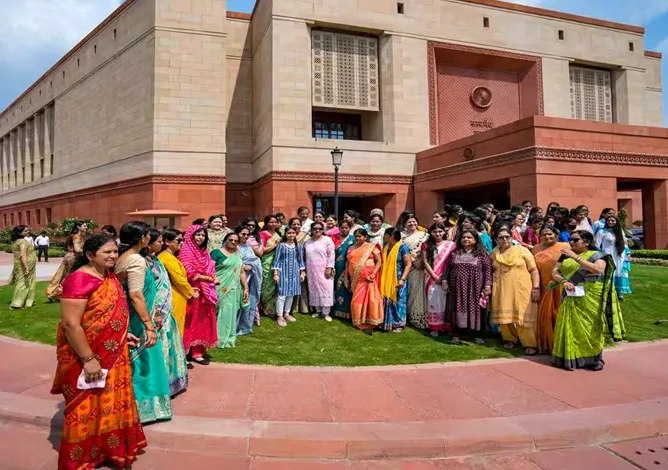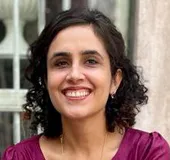
There is a widely held notion that women’s reservation in panchayats was introduced as a tokenistic gesture of empowerment, and has left them without any real power. This year marks 30 years since the enactment of the 73rd and 74th constitutional amendments which reserved one-third of seats for women in local administrative bodies. We contend that political quotas for women in local governance have been significant and empowering despite the apprehensions around it. Elected women representatives have contributed to improving development outcomes in rural India, but their contributions are largely undervalued and neglected. With the passing of the long-awaited Women’s Reservation Bill this year that reserves legislative seats for women, there are lessons to be drawn from the achievements and failures in their experiences in local government.
The constitutional amendments providing for women’s reservation in local bodies had a transformative impact at the grassroots level, resulting in the elevation of over 1.4 million women to leadership positions. Latest data reveals that around 44 percent of seats in local bodies are held by women in India, a significant record that makes India one of the top-performing countries in the world in women's political empowerment at the local level, leaving behind other major countries like France, United Kingdom, Germany, and Japan.
With the passing of the long-awaited Women’s Reservation Bill this year that reserves legislative seats for women, there are lessons to be drawn from the achievements and failures in their experiences in local government.
Encouraged by the political participation of women, many states have increased the quota for women representatives. Currently, 20 states have expanded reservations for women in their Panchayati Raj Institutions (PRIs) to 50 percent. In some states, like Karnataka, women have even surpassed this threshold, with more than 50 percent representation in PRIs, indicating that women are now succeeding in electoral wards that were not specifically reserved for them.
Panchayat-level politics has proved to be an indispensable platform for women to participate in public life and decision-making structures, substantially boosting their agency and self-confidence. In the domain of governance, studies have revealed that Elected Women Representatives (EWRs) at the panchayat level are less likely to be associated with corruption, and are more likely to demonstrate efficient leadership in developmental work like investing in health, education and improvement of drinking water facilities in rural areas. Quotas have also impacted gender-related issues and helped shape policy choices more attuned to women’s needs and concerns. EWRs play a key role in providing redressal support on issues of domestic violence and child marriage. Women’s entry into non-traditional spaces has challenged existing rigid gender norms in rural India. EWRs act as role models to other women in their communities and spur more women to participate in politics.
Persisting challenges for EWRs and the way forward
Despite the positive impact of political quotas for women, there are institutional and societal challenges they face that are different from their male counterparts. First, women representatives have often identified the policy of rotation of reserved seats every five years as a barrier to the continuation of their political careers. With the rotation of seats, female candidates are not able to gain from their experience from one term to the next, and they end up returning to their roles at home after a single term in office. Elected male representatives were found to be more likely to contest elections more than once as compared to elected women. Women leaders are rarely given the chance to contest from general unreserved seats as it is widely held that women candidates are less likely to win elections, which leads to political parties giving them fewer tickets. This is despite the fact that recent findings belie this notion.
With the rotation of seats, female candidates are not able to gain from their experience from one term to the next, and they end up returning to their roles at home after a single term in office.
Second, the gender digital divide which predominantly affects women in rural India, hampers the work of women representatives. This is relevant for panchayats as local governments are adopting more digitisation across the country for public service delivery and redressal. In a survey in Bihar, by the Centre for Catalysing Change, a civil society organisation, only 63 percent of EWR participants owned a phone and among them only 24 percent had a smartphone. Low digital literacy amongst women remains a major hurdle for women leaders in conducting their administrative functions efficiently.
Some states (Rajasthan, Maharashtra, Gujarat, Odisha, Andhra Pradesh, Telangana) follow the two-child norm which bars candidates (both male and female) with more than two children from contesting elections. States like Haryana and Rajasthan have also set minimum education qualifications for contesting elections. These policies inadvertently restrict women’s entry into politics as they are likely to lack access to education and choices in family planning. Data has indicated that women representatives usually belong to lower economic groups compared to men, they suffer from financial constraints both as contestants and as representatives, and financial support for women leaders from political parties and the state might be helpful to encourage more women to participate in politics.
Third, a number of surveys indicate that a majority of women representatives report facing gender-based discrimination and feeling ignored in the panchayat owing to their gender. Administrative roles, like that of panchayat secretary and other posts, are dominated by men. Most newly-elected women representatives find it difficult to deal with officials of block and district administration, line departments and police, thus male representatives or leaders related to the women representatives play a dominant role in interactions with external bodies. A major apprehension remains that in many regions across India, women leaders are elected as proxy candidates who are controlled by male members of their family and community. Such cases are widely reported even today.
Most newly-elected women representatives find it difficult to deal with officials of block and district administration, line departments and police, thus male representatives or leaders related to the women representatives play a dominant role in interactions with external bodies.
Despite good administrative work, women leaders receive less favourable assessments from their constituents than men. They have expressed that administrative work in panchayats was unsuitable for women or that they had felt incompetent in executing their responsibilities. Many have also expressed that they were unable to maintain the balance between work and household chores due to resistance from their spouses or families. In a 2019 survey from Uttar Pradesh, women had significantly less knowledge about political institutions and electoral rules.
Women representatives have played a critical role in redefining local priorities. However, addressing existing challenges in women’s participation at the local level by investing more in them through a mix of capacity-building programmes and institutional reforms would pave the way for strengthening the political agency of women and encouraging more meaningful participation in national and state legislatures.
Sunaina Kumar is a Senior Fellow at the Observer Research Foundation
Ambar Kumar Ghosh is an Associate Fellow at the Observer Research Foundation
The views expressed above belong to the author(s). ORF research and analyses now available on Telegram! Click here to access our curated content — blogs, longforms and interviews.




 PREV
PREV



